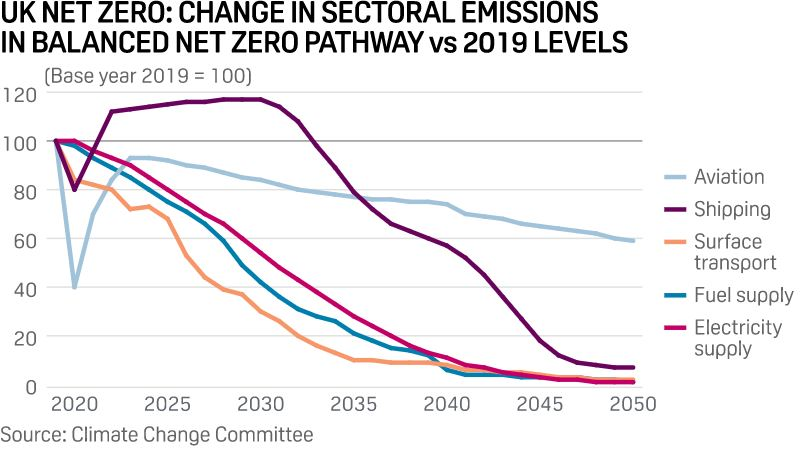The United Kingdom on April 20, 2023 unveiled an ambitious but groundbreaking climate change legislation aimed at slashing greenhouse gas (GHG) emissions by a staggering 78% by 2035 compared to 1990 levels. This commitment represents a significant acceleration of the UK’s previous target and places the country at the forefront of global efforts to combat climate change. The announcement comes as nations worldwide grapple with the urgent need to address environmental challenges and transition towards a more sustainable future.
The action encompasses a comprehensive set of measures, including a focus on electric vehicles, low-carbon heating, renewable energy, and dietary changes, marking a paradigm shift towards sustainability.
In this article, we will take a deep dive in this new goal and understand the implications.
A Carefully Crafted Pathway?
This ambitious target is arguably not arbitrary as it seems to have followed a researched pathway that charts a course from current emission levels to net zero by 2050. This involves a phased rollout of policies, incorporation of cutting-edge technologies, and anticipated behavioral changes over the next three decades. The commitment to emissions reduction is not just a long-term promise but a concrete plan backed by the Climate Change Committee, ensuring a well-defined trajectory to carbon-neutrality.
Decisive Decade for Transformation
The UK’s new target builds upon its previous commitment under the Climate Change Act to achieve a 68% reduction in emissions by 2030. The accelerated goal, aligned with the recommendations of the Climate Change Committee (CCC), is a response to the growing urgency of the climate crisis and a commitment to meet the targets outlined in the Paris Agreement.
This ambitious target reflects the UK’s commitment to addressing the global climate crisis. The CCC’s Sixth Carbon Budget, released in December 2020, played a pivotal role in shaping the UK’s emissions reduction roadmap. The report underscored the need for an almost 80% reduction in emissions by 2035 to align with global initiatives aimed at limiting global warming to 1.5 degrees Celsius.
The CCC report positions the next ten years as the “decisive decade of progress and action.” A critical aspect of this plan is the call for substantial low-carbon investments, with an annual target of up to £50 billion in the UK. The plan emphasizes the need for substantial low-carbon investments, increased government focus, and widespread engagement from various sectors over the next decade to achieve its targets. By setting ambitious emission reduction targets, the UK aims to inspire other nations to follow suit. The diplomatic drive to persuade other countries to adopt ambitious targets is crucial in the global fight against climate change.
Legally Binding Commitment
According to the Climate Change Act of 2008, the UK government is obligated to establish five-year emission reduction objectives, commonly referred to as carbon budgets. By adopting the recommendations outlined in the sixth carbon budget, the government has introduced a new binding commitment to reduce the nation’s greenhouse gas emissions by 78% by 2035, relative to 1990 levels.
This represents a 60% decrease from current emission levels and is arguably one of the most robust legally binding targets globally. Failing to achieve this objective would result in the government violating its own laws. Notably, this target stands out as one of the rare national goals that aligns with the imperative of limiting the global temperature increase to below the 1.5°C threshold set by the Paris Agreement. In contrast, President Joe Biden in the United States recently pledged to slash emissions by 50% by 2030, nearly doubling the 28% target set by Barack Obama in 2014.
Key Measures to Achieve the 78% Reduction
- Transportation Revolution:
- The commitment requires a substantial increase in electric vehicles on the roads, signaling a shift away from traditional combustion engines.
- Aviation and shipping will now fall under the purview of climate law, emphasizing the need for cleaner technologies in these industries.
- Energy Efficiency and Renewable Sources:
- Homes will undergo significant improvements in insulation, and individuals will be encouraged to reduce reliance on personal vehicles, opting for walking and cycling.
- The focus on renewable electricity, wind, and solar energy will play a pivotal role in achieving carbon reduction targets.
Key Sectors and Initiatives
The success of the net-zero plan relies heavily on addressing key sectors such as transportation and construction. In transportation, the government must rapidly deploy charging stations to facilitate the transition to battery-powered vehicles, while simultaneously curbing car and plane travel. Construction initiatives involve retrofitting homes, installing low-carbon heating, and promoting green new-builds. Additionally, the monumental task of replacing gas boilers and the proliferation of heat pumps must be prioritized.
Implication for the Transportation Sector
Achieving such a significant reduction necessitates transformative changes across various sectors. Within the transport sector, the plan entails achieving net-zero electricity production and ensuring all new cars, vans, and replacement boilers are zero-carbon by 2035.
While the prospect of dedicating 1% of the UK’s GDP over 30 years to the transition away from fossil fuels may seem daunting, the CCC asserts that the eventual fuel savings resulting from increased efficiency will offset these costs.
This transformative shift in energy production and consumption reflects the government’s commitment to a sustainable and green future. The challenge, therefore, lies in creating a conducive environment that encourages businesses and individuals to embrace sustainable practices and technologies.
Renewable Energy and Industrial Transformation
This details doubling renewable energy capacity over the next five years is imperative, accompanied by the installation of carbon capture technologies on new gas power plants. Industries must enhance energy efficiency and produce low-carbon, durable products. Substantial investments in hydrogen and carbon capture technologies are essential to remove five million tonnes of carbon dioxide from the atmosphere annually by 2030.
Agriculture and Lifestyle Changes
The agricultural sector must innovate to overcome inherent challenges and contribute to emissions reduction. Sustainable farming practices and reduced meat and dairy consumption are integral components of achieving net-zero targets. Concurrently, fostering a shift in individual eating habits within five years will be crucial to achieving the necessary reductions in meat and dairy consumption.
Setting the Stage
The UK’s commitment to slashing emissions by 78% by 2035 stands as a groundbreaking initiative in the global battle against climate change. Serving as a beacon of climate leadership, this ambitious plan not only sets an elevated standard for climate action but also emphasizes the urgency of prompt and resolute measures to forge a sustainable future for generations to come. As the UK endeavors to enshrine this commitment in law, the world is poised to witness the transformative actions taken to fulfill this ambitious target. The time is now for collective global efforts, echoing the UK’s commitment, to propel the world toward a greener, more sustainable future.
Found it interesting and would like more in the mail?




